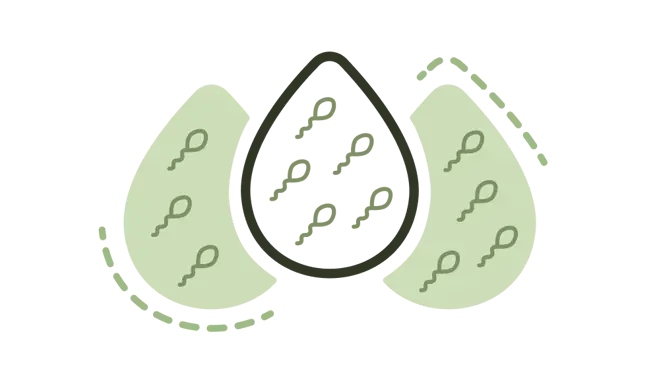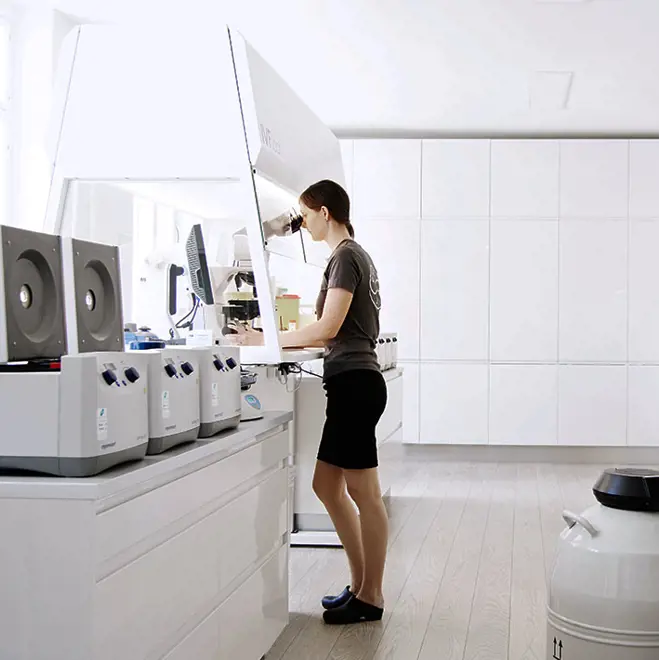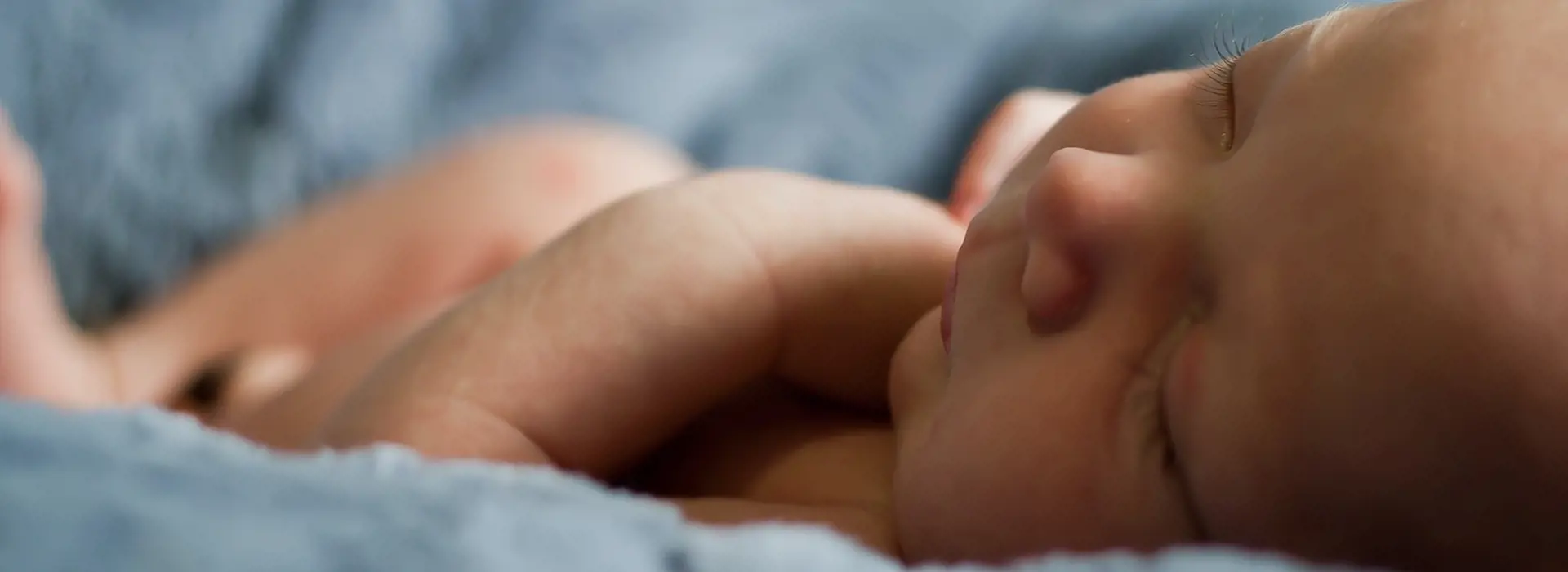Making the decision
Types of fertility treatment
IUI vs ICI
Units for IUI can be used for all types of fertility treatments, whereas units for ICI are only suited for vaginal inseminations or in cases where your clinic prefers to process the sperm themselves.
If you want to learn more about our IUI and ICI straws, keep reading.
Facts about straws
IUI-ready (intrauterine insemination) units have been processed (washed) by the sperm bank. Prior to cryopreservation, the motile sperm cells are separated from the seminal fluid through density gradient. They are then washed and a cryopreservative fluid is added.
When your clinic receives the IUI-ready sperm, it is ready for use, and does not need further processing before insemination. IUI-ready sperm is placed directly into the uterus during ovulation by passing a catheter through the cervical canal. Through this procedure, more sperm cells can reach the egg in the fallopian tubes and consequently more sperm is available for fertilisation. This increases the chance of pregnancy in comparison to sexual intercourse, as the sperm cells are inserted at the right time during the woman's cycle.
ICI (intracervical insemination) units contain all the naturally occurring ejaculate fluid and cells. There will still be plenty of motile sperm cells. The ICI units are used through vaginal insemination and placed high in the vagina, close to the cervix. The cervix and cervical fluid will only let the highly motile sperm cells up into the uterus and fallopian tubes, just as it would through natural intercourse.
ICI sperm must be washed at the clinic before being used for intrauterine insemination as only the sperm cells are to be placed inside the uterus. Unwashed sperm placed directly into the uterus may cause an allergic reaction in the form of anaphylactic shock.

MOT10+ or MOT20+
Amount of sperm cells in one straw
Whereas the terms IUI and ICI denote whether the sperm has been washed or not, MOT denotes the number of sperm cells in the straw. But what does MOT actually mean?
Treatment types
IUI Treatment
IUI treatments are recommended for women who are not aware of any fertility issues. The IUI treatment consists of the insemination of the washed sperm cells directly into the uterus through a catheter. This increases the likelihood of a larger amount of sperm cells reaching the egg, thereby increasing the chance of pregnancy.
Clinics often prefer to use IUI straws for this type of insemination. Some clinics use ICI straws as they prefer to wash the donor sperm themselves. We always recommend purchasing MOT20+ straws for IUI treatments, as this increases the chance of pregnancy. Learn more
Other types of fertility treatment
As of 1 July 2018, it is no longer permitted as per Danish legislation to send sperm straws to private addresses for home insemination. All women and couples who wish to have home insemination are required to cooperate with a health professional or clinic throughout the process. A health professional can be a doctor, midwife, or nurse.
This new legislation is intended to increase traceability in order to manage the number of pregnancies resulting from each donor.
In the case of IVF treatment, the woman's eggs are fertilised in a lab. The matured eggs are isolated from the body and placed in a Petri dish. IVF pregnancies are more commonly known as test tube pregnancies. A couple of days after fertilisation has occurred, the most developed egg is implanted in the woman's uterus where it can attach itself to the mucous membrane and develop into a foetus. Washed sperm is required for this type of treatment and IVF treatment is possible with MOT10+ and MOT20+ straws alike.
The ICSI treatment is another type of treatment where fertilisation happens in a lab. As part of the ICSI treatment, a sperm cell is injected into the egg using a small syringe. This type of treatment is recommended in cases of serious male infertility and low egg count. Just like with IVF treatments, it is possible to use both MOT10+ and MOT20+ sperm. That said, ICSI is not a common treatment when attempting fertilisation through donor sperm.
Treatment options
Assisted Home Insemination
(Only available for patients receiving treatment in Denmark).
At European Sperm Bank, we often receive enquiries from women and couples wishing to start their treatment at home. Therefore, we have now decided to make it easier for you should you wish to take advantage of assisted home insemination.
Assisted home insemination is for anyone wishing to conduct treatment in a home environment. The process requires the involvement of an authorised healthcare professional in Denmark and that you provide contact information about that person when you order your semen straws. We will take care of the rest.
Do you need help getting started? Please call us at +45 3834 3600, use the chat feature on this page or send us an e-mail at info@europeanspermbank.com.
Frequently Asked Questions
Assisted home insemination allows you to have an insemination in a home environment. The law requires an authorised healthcare professional or clinic to be associated with the course of treatment. A healthcare professional may be a doctor, midwife, nurse or gynaecologist.
Anyone can take advantage of assisted home insemination.
However, we always recommend that you consult your doctor or a healthcare professional about whether this type of treatment is appropriate for you and which period during your cycle is most suitable.
The success rate for pregnancy using home insemination is, of course, affected by female factors, but is similar to the chance of getting pregnant through sexual intercourse. The chance of getting pregnant in this way is therefore smaller than that of insemination at a clinic.
The process is simple. Once you have chosen your donor and wish to purchase a semen straw, you will need to provide the name of your healthcare professional in the checkout flow. We will then verify that the authorisation is in order and take care of the necessary papers. As soon as everything has been approved, we will send the semen straw and insemination kit to your healthcare professional.
If you do not become pregnant after a few attempts with assisted home insemination, we recommend that you consult a fertility specialist.

Choosing your fertility clinic
As a sperm bank, we guarantee donor sperm of the highest quality. The treatment itself is carried out at a fertility clinic. The clinic will run all the relevant tests and decide which treatment type is best for you based on a comprehensive consultation.
We have partnerships with clinics all over the world and are happy to help you find the right fertility clinic for you.
Find your sperm donor right here
All families are different and have a unique story. This means that the process of finding the right sperm donor is all about you. Start your search with the characteristics that you find the most important.

